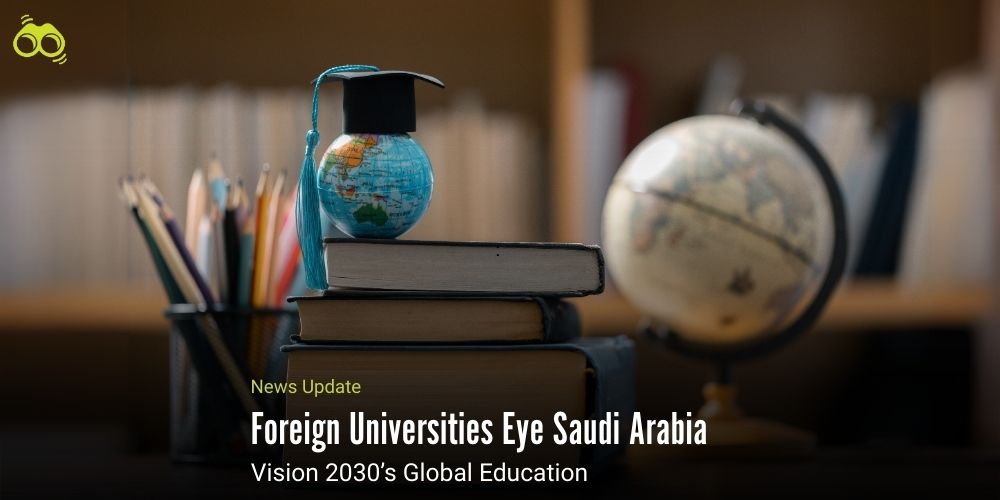Education Beyond Borders: Saudi Arabia’s High-Stakes Bid for Global Academic Leadership
Foreign Universities Weigh Opportunity Against Risk in Saudi Arabia’s Expanding Market
Saudi Arabia is rapidly emerging as a key destination for global educational expansion, attracting institutions keen to establish a presence in the region. With a well-defined regulatory framework, strategic partnerships, and a strong commitment to academic collaboration, the Kingdom offers a dynamic environment for international universities seeking to broaden their reach. Historically, Saudi Arabia has cultivated robust ties with global institutions through faculty and student exchanges, joint academic programmes, and shared certification initiatives. The King Abdullah Scholarship Program (KASP), launched in 2005, has played a pivotal role in enabling Saudi students to pursue higher education abroad, thereby enriching the nation’s academic ecosystem. Before recent regulatory changes permitting foreign universities to open independent campuses within the Kingdom, KASP was the primary pathway for Saudis studying overseas.
There is strong local support for foreign higher education institutions in Saudi Arabia. Initiatives such as the ‘Study in Saudi Arabia’ campaign aim to attract international students and researchers, promote academic opportunities, and foster global partnerships. These efforts align closely with Vision 2030’s objective to transform and internationalise the Saudi education sector. Foreign universities are demonstrating significant interest in establishing a presence in Saudi Arabia for several strategic reasons. The Kingdom’s geographic position in the Middle East provides a key advantage, positioning it as a potential hub for international education. Moreover, growing domestic demand is another major factor, with projections indicating the need for approximately 900,000 additional higher education seats by 2030.
Vision 2030 plays a central role in this development, aiming to diversify the economy and increase private sector participation in education. This policy environment is creating new opportunities for foreign academic institutions to enter the market. Universities are particularly attracted by prospects for joint academic programmes, branch campuses, and executive education centres, enabling them to serve both local and regional student populations. The Saudi government is actively encouraging foreign investment in higher education, with a focus on enhancing the quality of university-level instruction. Despite these promising opportunities, some institutions have expressed concerns about regulatory and operational uncertainties associated with entering a new market.
To address these concerns, Saudi Arabia issued the Executive Rules Regulating Foreign Universities’ Branches on 16 April 2025. These detailed regulations outline key requirements, including proof of financial stability, legal entity formation, commercial registration, and approvals from both the Ministry of Investment (MISA) and the Ministry of Education (MOE). These measures aim to ensure the quality and transparency of foreign institutions operating within the Kingdom.
Foreign universities seeking to establish a presence in Saudi Arabia face several practical challenges. Collaborating closely with local experts can significantly ease the process by helping institutions navigate both commercial and educational regulatory requirements and address operational complexities during setup and expansion. Additionally, cultural adaptation is essential; universities must align their academic offerings with local expectations to ensure long-term relevance and acceptance.
To date, five international universities have received licences to operate in Saudi Arabia: Arizona State University, the University of Wollongong, the University of Strathclyde, the Royal College of Surgeons in Ireland, and IE University. Furthermore, the University of New Haven has signed a memorandum of understanding with the Ministry of Education to open a branch campus in Riyadh by autumn 2026. The planned campus is expected to accommodate approximately 13,000 students and will house colleges specialising in Business and Digital Innovation, Engineering and Advanced Manufacturing, and Arts and Applied Sciences.
For those seeking deeper insights and practical guidance, Pinsent Masons is hosting a webinar on 17 June. The session will draw on the firm’s experience advising educational institutions entering the Saudi market, including perspectives gained from working in-house at leading universities within the Kingdom. Saudi Arabia’s evolving educational landscape presents promising opportunities for foreign institutions, provided they navigate regulatory requirements and cultural nuances effectively.
Editor’s Note:
Saudi Arabia's ambitious and timely Vision 2030 includes a significant push to become a global education hub, diversifying its economy and expanding higher education. This involves opening its doors to foreign institutions, signalling a strong investment in its youth and a willingness to embrace international collaboration and competition. While this presents a market ripe with potential, success will depend on navigating regulatory complexities and adapting to the local culture. It will require a genuine commitment to understanding the Saudi context and building meaningful partnerships, demanding more than just financial investment. Foreign universities’ cautious optimism about entering the Saudi Arabian education market is understandable, given the inherent uncertainties of any new venture. However, recent regulatory reforms offer much-needed clarity and signal the Saudi government’s commitment to facilitating and responsibly overseeing foreign participation. For the Kingdom, the challenge lies in balancing openness with rigorous quality assurance.
As Skoobuzz notes, this presents a potentially transformative opportunity for universities to expand their international footprint for years to come. If managed effectively, this dynamic could position Saudi Arabia as a leading hub for international education in the Middle East, delivering far-reaching benefits.














0 Comments (Please Login To Continue)